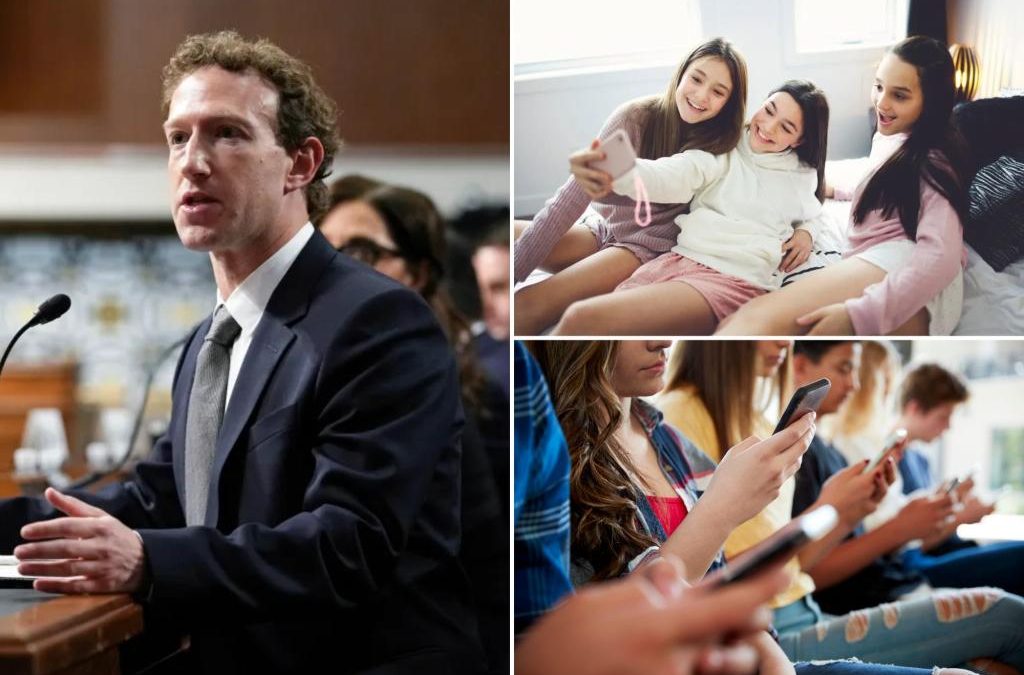Mark Zuckerberg will attempt to wriggle out of being held personally liable in two dozen lawsuits accusing Meta of addicting children to the company’s social media networks during an appearance in a California court Friday.
Zuckerberg, the world’s fourth richest person, is expected to make his case to dismiss any litigation against him, which would not impact the allegations against Meta, Bloomberg reported.
The Facebook and Instagram parent company has come under fire for not doing enough to protect children from scams like “sextortion,” where criminals trick kids into sending sexually explicit photos or videos and then threaten to release them unless they pay.
Zuckerberg has publicly maintained that his platforms are safe — despite multiple lawsuits that Meta has put profits before safety when it comes to the mental health of children.
Should US District Judge Yvonne Gonzalez Rogers decide to hold Zuckerberg personally liable in the lawsuits, the decision could serve as a model for other social media users looking to hold tech behemoth CEOs responsible in mass personal injury litigation.
However, overcoming corporate laws that traditionally shield executives from liability could prove tricky because decision-making at large companies like Meta is typically layered, legal experts said.
A Meta spokesperson told The Post that there’s ample precedent establishing that being an executive does not confer liability for alleged conduct of a corporation.
The spokesperson added that the claims also don’t say Zuckerberg violated a legal duty, and should be dismissed, in their entirety.
Judge Gonzalez Rogers has asked counsel on both sides to clarify how laws covering negligent misrepresentation and corporate officer responsibility vary among individual states.
Before making a ruling, the judge will certainly also weigh Zuckerberg’s involvement in day-to-day decisions at Meta, including his knowledge of the practices in question.
Plaintiffs’ lawyers — who have declared that as the boss of Meta, Zuckerberg has a responsibility to “speak fully and truthfully on the risks Meta’s platforms pose to children’s health” — will have to prove that Zuckerberg has control over decision-making to score a victory, according to Bloomberg.
“With great power comes great responsibility,” plaintiffs’ lawyers added in a court filing, a nod to the Spider-Man comics. “Unfortunately, Mr. Zuckerberg has not lived up to that maxim.”
Representatives for Meta did not immediately respond to The Post’s request for comment.
Meta was a swath of lawsuits, including one filed by New Mexico Attorney General Raul Torrez claims that Instagram was “not only aware that users under 13 were lying about their age to gain access to the platform, but that executives believed the answer to this solution was to ‘upsell’ the service as opposed to instituting stricter registration procedures.”
Instagram head Adam Mosseri allegedly concocted the plan in response to a massive “backlog” of some 700,000 accounts potentially belonging to users under age 13 that required review in late 2020, according to recently unredacted portions of Torrez’s December complaint.
The suit alleges that top boss Zuckerberg and other Meta executives prioritized profits even as kids were exposed to sex predators and disturbing content.
Meta’s failure to address online child safety risks was a major theme of last month’s bombshell Senate hearing on Capitol Hill — where lawmakers told Zuckerberg, TikTok CEO Shou Chew, and other executives that they had “blood on [their] hands.”
At one point, Zuckerberg stunned the audience when he stood up and apologized to the parents of victims of online abuse and exploitation.
Many of the families in attendance brought posters of their children who had either committed suicide or been psychologically damaged after being victimized by predators they met on Facebook and Instagram.
“Alex, Forever 17,” one sign read, “Carson Bride, Forever 16,” read another, and “Mason Bogard, Forever 15,” read a third. They were among more than 20 such signs held above the crowd.
During the hearing, Zuckerberg admitted Meta once had “discussions internally about whether we should build a kids’ version of Instagram.” He said Meta had never moved forward with the plans and “we currently have no plans to do so.”
Source




